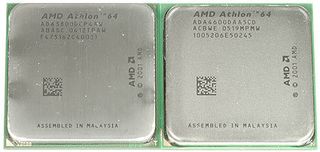Is Your PC Ready for a System Update?
Processor

We did not have the exact models that we chose for this upgrade project, but we had similar processors, whose clock speeds we adjusted to match the correct processor models. The Athlon 64 (left) and Athlon 64 X2 look alike, but the X2 has two processing units instead of just one.
The processor has traditionally been the most important PC component when it comes to performance, and the landscape has changed dramatically since the introduction of dual core and quad core models. While you can purchase an entry-level processor for as little as $35, we recommend that you go for a dual core model in any case, even if the clock speed it runs at might look pathetic. Both the AMD Athlon 64 X2 and Intel's Core 2 Duo or Pentium Dual Core processors are efficient and up to date; they will deliver more performance than any two year old mainstream processor under multi-threaded applications (those that were designed to take advantage of two CPU cores).
Any Socket AM2 AMD system can be equipped with most Athlon 64 X2 processors that are rated at a maximum of 89 W thermal design power (TDP), if you can get a proper BIOS version to support them. The power rating applies to all processor models whose product number starts with ADD, ADO and ADA. ADX stands for 125 W, which typically is required for FX models and chips rated 5600+ and up. If you want to use one of these, make sure that your motherboard supports them. However, we expect AM2 processors to be available for several more months, which doesn't make the upgrade urgent.
It is different with Socket 939, because there are only a few dual core processors left, and they won't be around for long. Pricegrabber lists only two models that we consider interesting: the Athlon 64 X2 3800+ at 2.0 GHz, and the 4200+ at 2.2 GHz, starting at $80 and $120. We don't recommend going for the faster Socket 939 models, as you will spend way too much on a rather old product. The 4200+ will run at the same 2.2 GHz as the Athlon 64 3500+, while providing the second CPU core.

We did not have an Athlon 64 X2 4200+ in our test lab, so we used a 4600+ and reduced the clock speed from 2.4 to 2.2 GHz for the benchmark runs.
Stay on the Cutting Edge
Join the experts who read Tom's Hardware for the inside track on enthusiast PC tech news — and have for over 25 years. We'll send breaking news and in-depth reviews of CPUs, GPUs, AI, maker hardware and more straight to your inbox.
Most Popular

